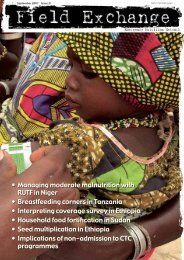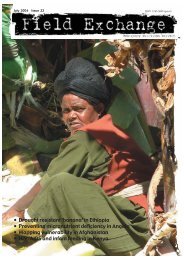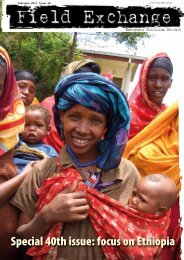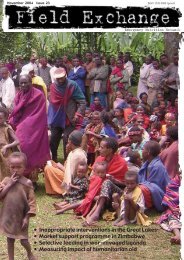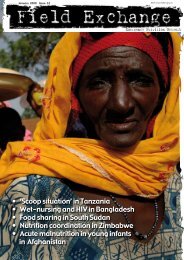Download a PDF of this issue - Field Exchange - Emergency ...
Download a PDF of this issue - Field Exchange - Emergency ...
Download a PDF of this issue - Field Exchange - Emergency ...
Create successful ePaper yourself
Turn your PDF publications into a flip-book with our unique Google optimized e-Paper software.
News<br />
Update on Minimum Reporting Package<br />
(MRP) trainings in London and Nairobi<br />
By Emily Mates, Nutrition Advisor, MRP, Save the Children UK<br />
The ‘Minimum Reporting Package’ (MRP)<br />
has been developed to support standardised<br />
data collection for emergency<br />
Supplementary Feeding Programmes (SFPs)<br />
(see Box 1). The need for <strong>this</strong> package was identified<br />
following analysis in 2005/6 (by the<br />
<strong>Emergency</strong> Nutrition Network (ENN) and Save<br />
the Children UK) <strong>of</strong> the efficacy and effectiveness<br />
<strong>of</strong> 82 emergency SFPs implemented<br />
between 2002 and 2005 . A key problem identified<br />
was that inadequate reporting standards<br />
were being followed, making it difficult to<br />
assess the efficacy <strong>of</strong> programmes without<br />
considerable re-analysis <strong>of</strong> data. An unexpected<br />
number <strong>of</strong> information gaps, inaccuracies and<br />
statistical errors were found, raising concerns<br />
over the quality <strong>of</strong> the interventions and implications,<br />
for the impact on beneficiaries, the<br />
accountability <strong>of</strong> agencies (to both donors and<br />
beneficiaries), and organisation’s capacity to<br />
learn from experience.<br />
The current phase <strong>of</strong> work (MRP rollout) is<br />
implemented by Save the Children UK and<br />
funded by ECHO to December 2012.<br />
London ToT<br />
Save the Children UK hosted a global training<br />
<strong>of</strong> trainers (ToT) in London in March 2012.<br />
Fourteen participants from eight international<br />
Box 1: What is the Minimum Reporting Package (MRP)?<br />
The MRP is a monitoring and reporting tool with<br />
harmonised reporting categories, definitions and<br />
indicators for 3 different (but <strong>of</strong>ten joined up)<br />
programmes to treat acute malnutrition: targeted<br />
Supplementary Feeding Programme (SFP),<br />
Outpatient Therapeutic Programmes (OTP), and<br />
Stabilisation Centre (SC).<br />
The MRP consists <strong>of</strong> three tools: user guidelines,<br />
s<strong>of</strong>tware, and a s<strong>of</strong>tware manual.<br />
The MRP presents harmonised reporting categories,<br />
definitions and indicators, conforming to the revised<br />
(2011) SPHERE standards for emergency SFPs across<br />
implementing agencies and countries . The tool<br />
intends to improve SFP programme management<br />
decisions, accountability and learning for moderate<br />
acute malnutrition (MAM) management as there is<br />
strong consensus for the urgent need for <strong>this</strong> learning<br />
across the international and governmental<br />
nutrition community.<br />
Box 2: Support services the MRP team* will provide<br />
for implementing agencies in 2012<br />
• Regional ToT trainings for country level staff<br />
starting in May 2012<br />
• Helpdesk for agencies for all questions around<br />
the MRP and use <strong>of</strong> the s<strong>of</strong>tware<br />
• Development <strong>of</strong> distance learning tool<br />
(e-learning) to complement the MRP User<br />
guidelines, the MRP s<strong>of</strong>tware manual and the<br />
MRP s<strong>of</strong>tware<br />
• Translation <strong>of</strong> MRP tools into French<br />
*The SC-UK MRP team comprises <strong>of</strong> three technical experts led<br />
by Emily Mates.<br />
agencies were trained in the use <strong>of</strong> the MRP<br />
tools.<br />
Overall the MRP and accompanying s<strong>of</strong>tware<br />
were positively received by agencies<br />
attending. Comments included:<br />
The MRP:<br />
“… is good and has great potential. I hope it is taken<br />
on by others (NGOs, the cluster) and can become a<br />
standard.”<br />
“… is <strong>of</strong>f to a good start; (the s<strong>of</strong>tware) is really user<br />
friendly in most aspects.”<br />
“… is an effective monitoring tool for higher level<br />
support.”<br />
The aspects <strong>of</strong> it mentioned as most useful<br />
were:<br />
• The MRP s<strong>of</strong>tware is able to reduce time in<br />
preparing reports.<br />
• The user friendliness <strong>of</strong> the automatic<br />
calculation <strong>of</strong> performance indicators and<br />
graphs through the s<strong>of</strong>tware.<br />
• The usefulness <strong>of</strong> the harmonised reporting<br />
categories and performance indicators<br />
being standardised across agencies.<br />
Agencies showed considerable interest in the<br />
MRP and its application at field level. All agencies<br />
present at the training announced plans to<br />
either use the MRP as their internal reporting<br />
system, or to ‘feed’ their internal data into the<br />
MRP centralised database, in order to<br />
contribute to the learning objective on MAM.<br />
MRP field use and complementarily with<br />
other systems<br />
The training initiated wider discussions on the<br />
MRP and its planned roll-out amongst agencies<br />
in 2012, with the opportunity for the MRP team<br />
to clarify <strong>issue</strong>s raised by participants, for<br />
example on the MRP field use and complementarily<br />
with other systems. Whilst the focus is on<br />
emergency SFPs, indicators relevant to the<br />
collection <strong>of</strong> data from emergency therapeutic<br />
programmes that treat severe acute malnutrition<br />
(SAM) have recently been included. The<br />
development <strong>of</strong> an optional SAM module was<br />
driven by requests from NGOs who preferred<br />
to use one ‘package’ for reporting, where SFP<br />
was delivered as part <strong>of</strong> a ‘full’ CMAM<br />
programme that included both SAM and MAM<br />
treatment. Should national governments,<br />
UNICEF and other partners subsequently wish<br />
to use (or integrate) the MRP into national<br />
reporting systems, the s<strong>of</strong>tware would need<br />
some alteration and/or further simplification in<br />
order to fulfil <strong>this</strong> need.<br />
Nairobi regional training<br />
Very positive feedback on the MRP and its s<strong>of</strong>tware<br />
was received from participants <strong>of</strong> the<br />
regional MRP training that was held in Nairobi<br />
(8th -10th May, 2012). In attendance were 15<br />
participants from seven agencies working in<br />
Somalia, South Sudan and Ethiopia. Training is<br />
planned for June/July 2012 in Niamey, Niger, as<br />
soon as the MRP tools have been translated into<br />
French.<br />
Additional considerations<br />
The MRP roll-out is expected to gather pace in<br />
2012, following the regional trainings to be held<br />
in East and West Africa and additional support<br />
from the MRP team to implementing agencies<br />
(see Box 2).<br />
The MRP project can deliver standardised<br />
information within a short period <strong>of</strong> time,<br />
particularly for MAM programming, as long as<br />
critical stakeholders and enough implementing<br />
agencies support its application. Both the<br />
London and Nairobi trainings were well<br />
received by the implementing agencies in attendance,<br />
and were successful in training<br />
participants in the use <strong>of</strong> the MRP.<br />
The MRP includes a specific piece <strong>of</strong> s<strong>of</strong>tware<br />
for analysis <strong>of</strong> data. This does not rule out<br />
the use <strong>of</strong> the reporting guidelines and/or the<br />
collection and analysis <strong>of</strong> data using other s<strong>of</strong>tware<br />
systems that have been, or will be,<br />
developed for reporting and analysis <strong>of</strong> acute<br />
malnutrition programming data<br />
In the longer-term, the merging <strong>of</strong> MRP<br />
reporting categories within national reporting<br />
systems may prove useful. However, key to any<br />
successful merging is to ensure that systems<br />
already in place or those to be set-up have<br />
common reporting criteria and guidelines, to<br />
ensure that the data is comparable.<br />
1<br />
See report at http://www.ennonline.net/research/supplementary<br />
2<br />
There is also an optional severe acute malnutrition (SAM)<br />
module that may be useful for programme managers to<br />
use where SFP is delivered as part <strong>of</strong> a CMAM programme.<br />
3<br />
The MRP project will gather SFP data from partners, using<br />
the MRP s<strong>of</strong>tware for analysis <strong>of</strong> SFP effectiveness and<br />
efficacy (learning objective <strong>of</strong> the MRP).<br />
4<br />
Agencies attending: ACF-Spain , ACF-USA Concern<br />
Worldwide, GOAL, Islamic Relief, World Vision, WFP and<br />
Save the Children UK<br />
5<br />
Agencies attending included ACF USA, Concern Worldwide,<br />
GOAL, IMC, Islamic Relief, Save the Children, WFP<br />
The European Commission’s Humanitarian Aid department funds relief operations<br />
for victims <strong>of</strong> natural disasters and conflicts outside the European Union. Aid is<br />
channelled impartially, straight to people in need, regardless <strong>of</strong> their race, ethnic<br />
group, religion, gender, age, nationality or political affiliation.<br />
This article has been produced with the financial assistance <strong>of</strong> the European<br />
Commission. The views expressed herein should not be taken, in any way, to reflect<br />
the <strong>of</strong>ficial opinion <strong>of</strong> the European Commission.<br />
66



